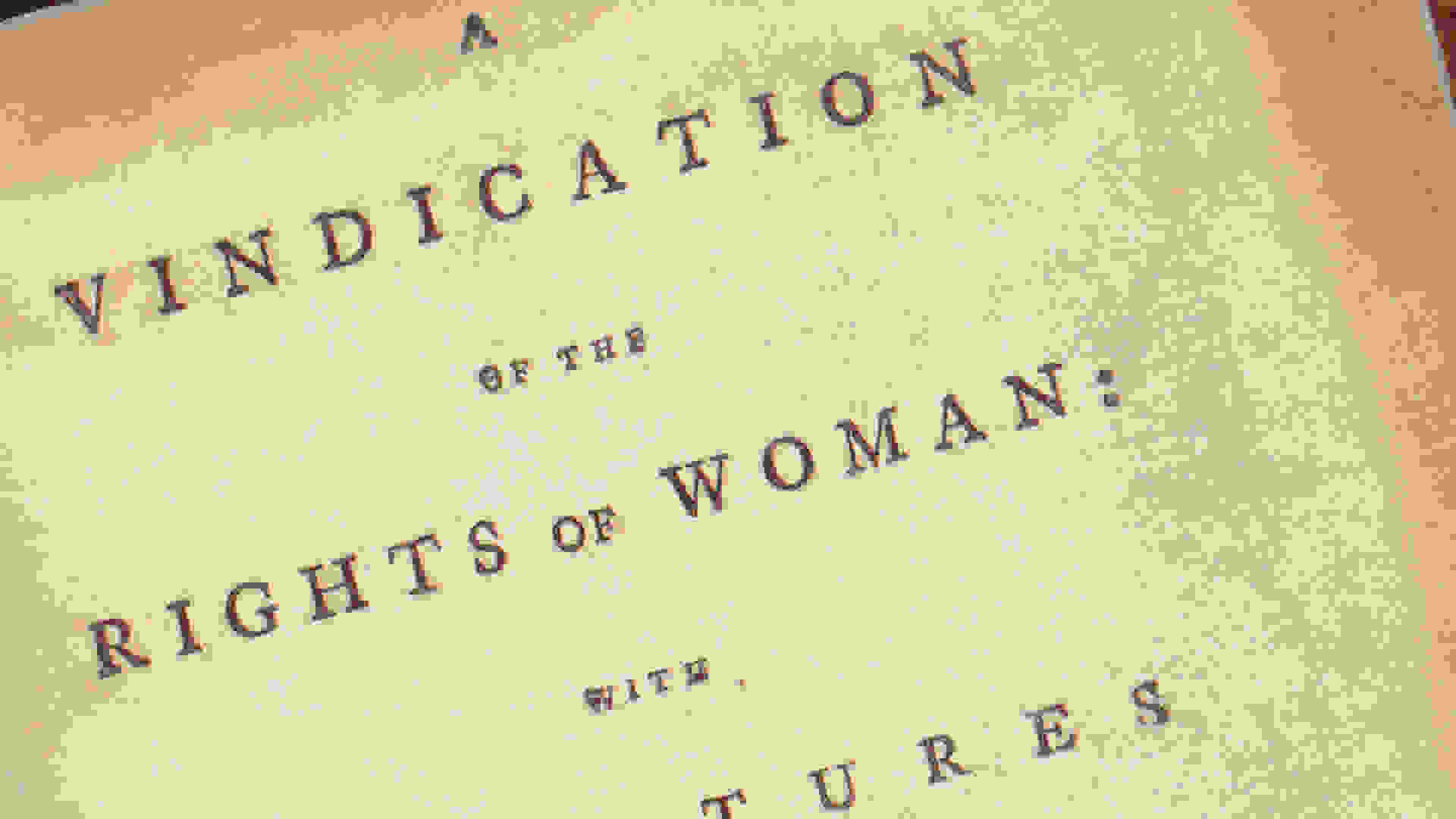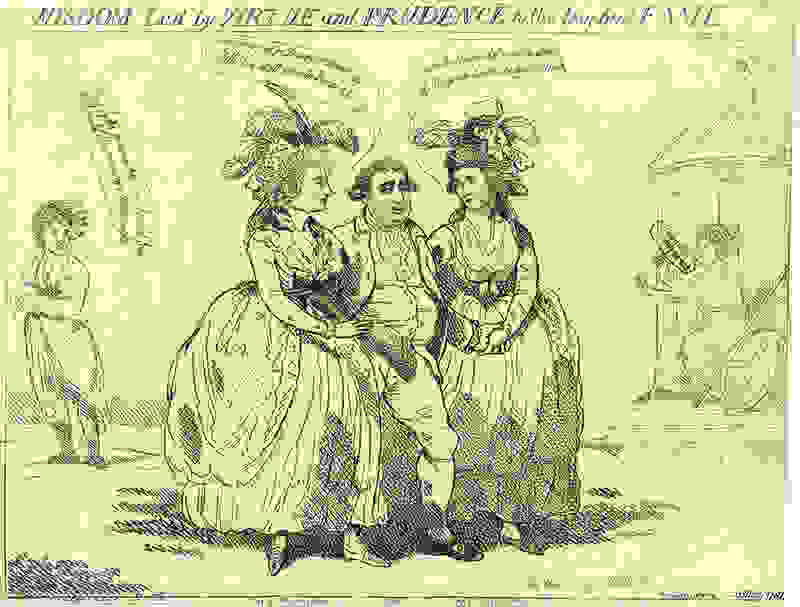'A public phenomenon... impossible to explain': franchise reform in the long 18th century
Thu. 8 Mar 2018
The first women in the UK got the vote 100 years ago - but what about the preceding centuries? As the Vindication of the Rights of Woman was published in 1792, how were debates surrounding women’s suffrage being framed? And why did it take 86 years after the extension of male suffrage in 1832 for the franchise to be granted to just a small number of women?

, History of Parliament Trust
Dr Robin Eagles
Dr Robin Eagles
Editor of the House of Lords (1660-1832), History of Parliament Trust
Dr Robin Eagles is Editor of the House of Lords (1660-1832) section at the History of Parliament Trust, currently working on the history of the Lords, 1715-1790. His publications include an edition of the diaries of 18th-century radical MP John Wilkes and numerous entries in the History of Parliament: the Lords 1660-1715 (CUP, 2016). You can follow the progress of the ‘Georgian Lords’ on Twitter, @GeorgianLords, and via the blog series.
Get our latest research, insights and events delivered to your inbox
Share this and support our work
On 21 March 1776 John Wilkes rose to his feet in the House of Commons to deliver one of his most famous speeches arguing for reform of the franchise. His complaint about the present state of affairs focused on two main points. First, that the chamber as then constituted had altered little since the 1680s and required the ‘disfranchising of the mean, venal, and dependent boroughs’. Second, and more radically, he argued that the franchise was no longer sufficiently representative and called for the vote to be awarded to a number of those currently not eligible:
"The meanest mechanic, the poorest peasant and day labourer, has important rights respecting his personal liberty, that of his wife and children, his property, however inconsiderable, his wages, earnings, the very price and value of each day’s hard labour, which are in many trades and manufactures regulated by the power of Parliament... Some share therefore in the power of making those laws... should be reserved even to this inferior, but most useful, set of men"
The Eighteenth-Century Constitution, ed. E.N. Williams (Cambridge, 1960, p. 217
Historians have questioned the extent to which Wilkes was ever truly committed to the programme he laid out in his March address. Some have concluded that this was little more than grandstanding, while others have concluded more generously that the intention was genuine but that the times were against him as attention shifted to the developing crisis in America.

Mary Wilkes and John Wilkes, by Johann Zoffany (1782, CC BY-NC-ND)
If the times were indeed against him, Wilkes was not alone in advocating reform at this juncture. From the 1770s onwards a variety of programmes of reform were advocated by a range of voices, from the most radical like Major Cartwright to the more moderate like Christopher Wyvill. In 1780 the 3rd duke of Richmond (who was as his biographer Alison Olson expressed it, ‘at the far left of the spectrum’) proposed his own reform bill arguing for manhood suffrage. When William Pitt proposed a reform measure shortly after taking office as Prime Minister, though, he took a more moderate stance and concentrated on the disfranchisement of rotten or unrepresentative boroughs. This principle of redistribution remained a key feature of the reform agenda through to the Great Reform Act of 1832 and beyond.
One thing, though, is very clear. At no point did Wilkes, Richmond or Pitt advocate extending the franchise to women. In Wilkes’s case, this is perhaps noteworthy when one considers his very close and very respectful relationship with his daughter, Polly (the same cannot be said of his distant relationship with his estranged wife). Why did no one appear to advocate extending the franchise to women at this point? Might it be concluded that for as long as the franchise remained closely attached to a property qualification, even elite women might struggle to be considered worthy?
Such a picture would seriously misrepresent the role of women in politics in the period. Propertied women (among them heiresses, dowagers and unmarried women with their own fortunes) did wield substantial influence in their own right. Historians have highlighted the lively involvement of characters such as Georgiana, duchess of Devonshire, and Lady Susan Keck, all of whom were actively engaged in electoral campaigning – though it is worth noting that in the case of the latter, as Professor Elaine Chalus has emphasized, she was as a result subjected to gendered abuse and dubbed ‘my Lord Sue’ for daring to usurp what was perceived to be a man’s role.

Wisdom led by virtue and prudence to the temple of fame, by John Wallis (1784, CC BY-NC-SA 4.0)
This response is perhaps the more curious given that in Oxfordshire, where Lady Susan was active, there had been a long tradition of influential aristocratic women exerting their interest; and Lady Susan was far from the only one engaged in the 1754 election, when she was at her most active. In the previous century, Anne, dowager countess of Rochester (mother of the poet earl of Rochester and mother-in-law of his countess, Elizabeth, who was also a talented poet in her own right) had wielded interest both there and in Wiltshire, while her contemporary, Lady Lovelace was ‘very busy’ during the city elections for Oxford in 1681. Sarah, duchess of Marlborough, was similarly engaged both in Woodstock, where the Marlboroughs’ seat Blenheim was constructed, and in St Albans.
These aristocratic women were able to assert themselves by virtue of their high social status and undoubtedly had a significant role to play in securing the return of candidates in a variety of constituencies. Women from humbler backgrounds may have lacked this kind of interest, but by the end of the century one at least was calling into question the inequalities of the world.
In her Vindication of the Rights of Women (1792), Mary Wollstonecraft questioned directly the inequalities between men and women. Even so, she referred only very obliquely to the possibility of changing the nature of the franchise. Where she did was most apparent in her dedication to Talleyrand in which she quoted from his pamphlet on National Education:
"to see one half of the human race excluded by the other from all participation of government, was a public phenomenon that, according to abstract principles, it was impossible to explain."
As Wollstonecraft argued, though, education was the key, and for as long as women’s education was inferior to that of men, they would remain in a subservient condition.
The combination of poorer educational expectations combined with the inability to exert equal control over property meant that throughout the 18th century there was never any real prospect of extending the franchise to women and this remained the case for as long as fundamental assumptions regarding ‘liberty and property’ and appropriate ‘spheres’ remained the norm. Besides, when reform finally became a reality, the cause of women’s suffrage proved to be just one among many. For those unsympathetic to extending the vote to people of both sexes they were able to point to other venues where women were gradually acquiring a greater say: in particular on local councils and educational boards. But, while prominent elite women continued to exert their influence much as their predecessors had done, from the mid-19th century onwards the picture was changing as increasing numbers of women of all backgrounds became politically active and a growing number began to demand to be enfranchised.
More
Related
Blog / Controverted elections: how disputed results used to be part and parcel of English political and parliamentary life
Disputed parliamentary election results – often taking months to resolve – were a frequent feature of English political culture before the reforms of the 19th century. But how could defeated candidates protest the result of an election, and how were such disputes resolved?
Blog / The Brecon and Radnorshire recall petition process: personal reflections by Sir Paul Silk
As an elector in Brecon and Radnorshire, Hansard Society Trustee Sir Paul Silk sets out 12 shortcomings he observed in the recall petition process that led on 21 June to the triggering of a parliamentary by-election in the constituency.
Journal / Parliamentary Affairs: special issue on 'Parliamentary work, re-selection and re-election' (vol 71, issue 4, 2018)
This special issue of Parliamentary Affairs brings together comparative research across European legislatures to see how much influence MPs' day-to-day legislative and scrutiny work has on voters when they head to the polls. This issue also includes then-Commons Speaker John Bercow's 2016 Bernard Crick Lecture, 'Designing for Democracy'.
Blog / How important are competence and leadership in people's party choice?
At a time of political upheaval – with questions being asked about the leadership, policies and competence of both main UK parties – our Audit of Political Engagement reveals some interesting findings about the ways in which Conservative and Labour supporters view these factors differently and how their importance has changed over time.
Journal / Parliamentary Affairs: special issue on 'The 2017 French presidential and parliamentary elections' (vol 71, issue 3, 2018)
To mark the 2017 French parliamentary and presidential election, this special issue of Parliamentary Affairs looks at the realignment of French politics and revival of the presidency, the demise of the Left, and how policy choices for the Front National influenced its electoral success.
Events / Launch of 'Britain Votes 2017'
On 20 March, Professor Sir John Curtice and a panel of leading commentators outlined their findings at the launch of the first major study of the 2017 general election, 'Britain Votes 2017'.
Blog / The case for more politicians – electoral reform and the Welsh Assembly
The Welsh Assembly’s Expert Panel on Electoral Reform has today re-made the call for an increase in the Assembly’s size. One of the Panel’s members, former Clerk to the National Assembly Sir Paul Silk, here explains why.
Blog / Populist personalities? The Big Five Personality Traits and party choice in the 2015 UK general election
James Dennison examines the association between personality traits and party choice in the 2015 UK General Election.
Blog / Suppose they gave a war and no-one came?
'Suppose they gave a war and no one came?' became a catchphrase of the US peace movement in the 1960s. What happened over the last week in British politics couldn’t help but remind me of it. Why?
Reports / MPs and Politics In Our Time
This 2005 report reviewed the evidence on public attitudes towards MPs and political institutions, and presented findings on MPs' own views of their relationship with voters. It set out a far-reaching agenda for change in the relationship between electorate and the elected in the interests of building public trust and encouraging democratic renewal.
Latest
Guides / Financial Scrutiny: the Budget
In order to raise income, the government needs to obtain approval from Parliament for its taxation plans. The Budget process is the means by which the House of Commons considers the government’s plans to impose 'charges on the people' and its assessment of the wider state of the economy.
Guides / Financial Scrutiny: the Estimates Cycle
In order to incur expenditure the government needs to obtain approval from Parliament for its departmental spending plans. The annual Estimates cycle is the means by which the House of Commons controls the government’s plans for the spending of money raised through taxation.
Data / Coronavirus Statutory Instruments Dashboard
The national effort to tackle the Coronavirus health emergency has resulted in UK ministers being granted some of the broadest legislative powers ever seen in peacetime. This Dashboard highlights key facts and figures about the Statutory Instruments (SIs) being produced using these powers in the Coronavirus Act 2020 and other Acts of Parliament.
Briefings / The Economic Crime (Transparency and Enforcement) Bill: four delegated powers that should be amended to improve future accountability to Parliament
The Bill seeks to crack down on ‘dirty money’ and corrupt elites in the UK and is being expedited through Parliament following Russia’s invasion of Ukraine. This briefing identifies four delegated powers in the Bill that should be amended to ensure future accountability to Parliament.
Articles / Brexit and Beyond: Delegated Legislation
The end of the transition period is likely to expose even more fully the scope of the policy-making that the government can carry out via Statutory Instruments, as it uses its new powers to develop post-Brexit law. However, there are few signs yet of a wish to reform delegated legislation scrutiny, on the part of government or the necessary coalition of MPs.